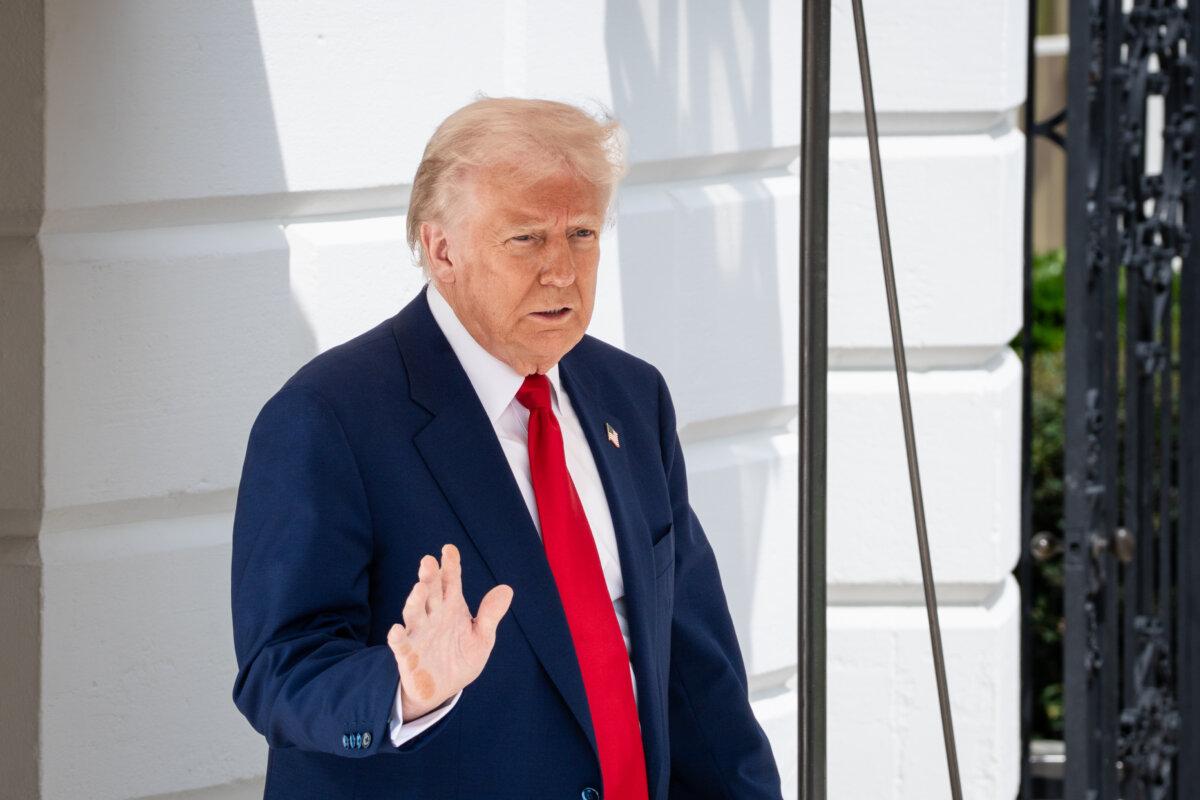Trump encouraged Powell to cut interest rates, citing lower inflation levels and solid employment gains.
President Donald Trump’s sweeping tariffs could lead to persistent inflation and slower economic growth, Federal Reserve Chair Jerome Powell said on April 4.
The White House recently unveiled its sweeping trade agenda, revealing 10 percent baseline universal tariffs and higher reciprocal levies on advanced and developing economies.
The central bank chief said that the U.S. tariff rates were higher than expected, which could have adverse economic effects, such as higher inflation and slower growth.
He noted that avoiding this outcome would require ensuring long-term inflation expectations remain stable and close to the institution’s 2 percent target. Powell said the Fed’s job is to ensure that a tariff-fueled one-time price adjustment “does not become an ongoing inflation problem.”
Recent consumer surveys have highlighted higher near- and long-term inflation prospects. The University of Michigan’s March Consumer Sentiment Index, for example, reported the 1- and 5-year outlooks rising to 5 percent and 4.1 percent, respectively.
Powell’s comments were a shift in tone from last month, when he suggested that tariff-driven inflation could be “transitory.”
The Fed chair said that the central bank’s easing cycle remains on hold indefinitely as policymakers seek greater clarity.
“It is too soon to say what will be the appropriate path for monetary policy,” Powell said.
Overall, he said, the Federal Reserve faces “a highly uncertain outlook” amid higher risks to the inflation and unemployment outlook.
“This would be a perfect time for Fed Chairman Jerome Powell to cut Interest Rates. He is always ‘late,’ but he could now change his image, and quickly,” Trump wrote. “Cut interest rates, Jerome, and stop playing politics.”
In March, the U.S. economy created a hotter-than-expected 228,000 new jobs, up from February’s downwardly adjusted 117,000.
The market has also increased its rate cut forecasts from two to five this year, Natalia Lojevsky, managing director at CIFC Asset Management, said in a note to The Epoch Times.
“The central bank will likely need to see the ‘hard data’ deteriorate much more significantly before taking such aggressive action, given current inflation that is still well above their target range and the still unknown inflationary impacts of the tariffs,” Lojevsky said.
The next batch of inflation reports will be released next week.

President Donald Trump departs the White House on April 3, 2025. Madalina Vasiliu/The Epoch Times
In February, the Fed’s preferred inflation gauge, the personal consumption expenditure (PCE) price index, was flat at 2.5 percent, in line with the consensus forecast. However, core PCE, which strips the volatile energy and food prices, ticked up to 2.8 percent from 2.7 percent.
Not Worried
Senior administration officials have dismissed inflation fears.
Treasury Secretary Scott Bessent stated that Trump’s tariff maneuvers might generate a one-time price adjustment.
He also responded to Federal Reserve officials’ prognostications of transitory inflation.
“I would hope that the failed ‘Team Transitory’ could get back together and think that nothing is more transitory than tariffs if it’s a one-time price adjustment,” Bessent said.
Prices on foreign goods could go up, but American-made products will remain the same, says Commerce Secretary Howard Lutnick.
“So if you’re looking at Poland Springs water versus something—let’s say, Fiji water—the Poland Springs is not going to be more expensive.”
Inflation estimates among economists have varied over the past few months, ranging from negligible differences in inflation readings to sizable effects.
Balancing Act at the Fed
A chorus of Fed officials has delivered remarks in recent days, including Vice Chair Philip Jefferson.
Speaking at an April conference sponsored by the Atlanta Fed, Jefferson stated that “economic activity may be constrained” if uncertainty continues or deteriorates.
Despite growing concerns about the broader economy, the Fed vice chair said his colleagues do not “need to be in a hurry” to take policy action.
Echoing Powell’s recent sentiment, Jefferson said monetary authorities will need to carefully evaluate the administration’s ongoing changes to fiscal, immigration, regulatory, and trade policies. If the economy remains steady and progress on inflation stalls, the Fed could keep monetary policy tighter for longer. However, policy could ease if the labor market weakens and inflation plummets.
The U.S. central bank maintains a dual mandate of maximum employment and price stability.
St. Louis Federal Reserve President Alberto Musalem said he is worried that Trump’s tariffs may not be transitory.
The next Federal Open Market Committee policy meeting will be held on May 6 and 7.
Original News Source Link – Epoch Times
Running For Office? Conservative Campaign Consulting – Election Day Strategies!


